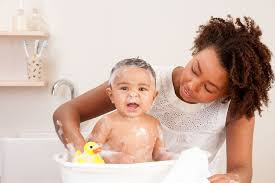Safe Bathing Practices for Babies:
Understanding Infant Skin:
- Sensitive Skin: Babies have delicate and sensitive skin that requires gentle care.
- Natural Oils: Newborn babies have a protective layer of natural oils on their skin, which should be preserved during bathing.
- Avoid Harsh Chemicals: Using harsh soaps or detergents can strip the skin of its natural oils and lead to dryness and irritation.
Bathing Frequency:
- Daily Bathing: While daily bathing is often recommended, it's not necessary for all babies. Some parents may find that less frequent bathing is sufficient, especially if their baby has sensitive skin.
- Sponge Baths: For newborns or babies with umbilical cord stumps, sponge baths may be preferred until the cord has healed.
Water Temperature:
- Lukewarm Water: The water temperature should be lukewarm, around 100°F (38°C). Test the water with your elbow before putting your baby in.
- Avoiding Burns: Be cautious of hot water, as babies' skin is sensitive and can be easily burned.
Products and Supplies:
- Gentle Products: Use mild, fragrance-free baby products, such as soap, shampoo, and lotion.
- Soft Towels: Opt for soft, absorbent towels that won't irritate your baby's skin.
- Baby Bath Tub or Sink: A baby bath tub or the sink can be used for bathing, but ensure the surface is non-slip.
Additional Tips:
- Support and Safety: Always support your baby's head and neck while bathing. Never leave your baby alone in the bathtub, even for a moment.
- Routine: Establishing a consistent bathing routine can help your baby feel secure and relaxed.
- Bonding Opportunity: Bathing can be a wonderful opportunity for bonding with your baby. Talk to them, sing songs, or simply enjoy the quiet time together.
By following these guidelines, you can ensure a safe and enjoyable bathing experience for your baby while protecting their delicate skin. Remember, every baby is different, so it's important to listen to your pediatrician's advice and adjust your bathing routine as needed.
